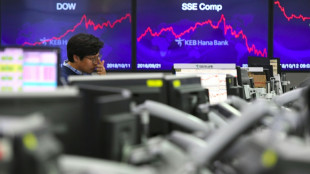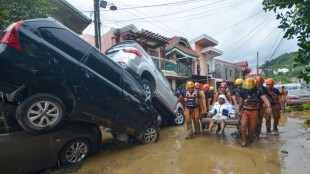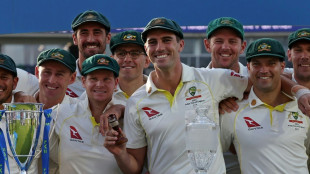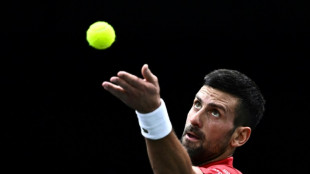-
 Medieval tower collapse adds to Italy's workplace toll
Medieval tower collapse adds to Italy's workplace toll
-
BMW boosts profitability despite China, tariff woes

-
 South Africa's Wiese wary of 'hurt' France before re-match
South Africa's Wiese wary of 'hurt' France before re-match
-
Asian markets sink as tech bubble fears grow

-
 Beyond limits: Croatian freediver's breathtaking record
Beyond limits: Croatian freediver's breathtaking record
-
Tottenham supporting Udogie after alleged gun threat in London

-
 Thunder roll Clippers to stay unbeaten as SGA keeps streak alive
Thunder roll Clippers to stay unbeaten as SGA keeps streak alive
-
In appeal, Australian mushroom murderer alleges 'miscarriage of justice'

-
 Toyota hikes profit forecasts 'despite US tariffs'
Toyota hikes profit forecasts 'despite US tariffs'
-
Typhoon death toll soars past 90 in the Philippines

-
 Ex-France lock Willemse challenges Meafou to become 'the bully'
Ex-France lock Willemse challenges Meafou to become 'the bully'
-
Ukrainians to honour sporting dead by building country they 'died for': minister

-
 At least 7 dead after UPS cargo plane crashes near Louisville airport
At least 7 dead after UPS cargo plane crashes near Louisville airport
-
US Supreme Court hears challenge to Trump tariff powers

-
 US government shutdown becomes longest in history
US government shutdown becomes longest in history
-
India's Modi readies bellwether poll in poorest state

-
 Green goals versus growth needs: India's climate scorecard
Green goals versus growth needs: India's climate scorecard
-
Where things stand on China-US trade after Trump and Xi talk

-
 Sri Lanka targets big fish in anti-corruption push
Sri Lanka targets big fish in anti-corruption push
-
NY elects leftist mayor on big election night for Democrats

-
 Injured Jordie Barrett to miss rest of All Blacks tour
Injured Jordie Barrett to miss rest of All Blacks tour
-
Asian markets tumble as tech bubble fears grow

-
 Pay to protect: Brazil pitches new forest fund at COP30
Pay to protect: Brazil pitches new forest fund at COP30
-
Australia pick 'impressive' Weatherald in first Ashes Test squad

-
 Iraq's social media mercenaries dying for Russia
Iraq's social media mercenaries dying for Russia
-
Young leftist Trump foe elected New York mayor

-
 Concerns at ILO over expected appointment of close Trump advisor
Concerns at ILO over expected appointment of close Trump advisor
-
Venus Williams to return to Auckland Classic at the age of 45

-
 No deal yet on EU climate targets as COP30 looms
No deal yet on EU climate targets as COP30 looms
-
Typhoon death toll climbs to 66 in the Philippines

-
 NATO tests war preparedness on eastern flank facing Russia
NATO tests war preparedness on eastern flank facing Russia
-
Uncapped opener Weatherald in Australia squad for first Ashes Test

-
 Liverpool down Real Madrid in Champions League, Bayern edge PSG
Liverpool down Real Madrid in Champions League, Bayern edge PSG
-
Van Dijk tells Liverpool to keep calm and follow Arsenal's lead

-
 PSG left to sweat on injuries to Dembele and Hakimi
PSG left to sweat on injuries to Dembele and Hakimi
-
Reddit, Kick to be included in Australia's social media ban

-
 Ex-Zimbabwe cricket captain Williams treated for 'drug addiction'
Ex-Zimbabwe cricket captain Williams treated for 'drug addiction'
-
Padres ace Darvish to miss 2026 MLB season after surgery

-
 Diaz hero and villain as Bayern beat PSG in Champions League showdown
Diaz hero and villain as Bayern beat PSG in Champions League showdown
-
Liverpool master Real Madrid on Alexander-Arnold's return

-
 Van de Ven back in favour as stunning strike fuels Spurs rout
Van de Ven back in favour as stunning strike fuels Spurs rout
-
Juve held by Sporting Lisbon in stalling Champions League campaign

-
 New lawsuit alleges Spotify allows streaming fraud
New lawsuit alleges Spotify allows streaming fraud
-
Stocks mostly drop as tech rally fades

-
 LIV Golf switching to 72-hole format in 2026: official
LIV Golf switching to 72-hole format in 2026: official
-
'At home' Djokovic makes winning return in Athens

-
 Manchester City have become 'more beatable', says Dortmund's Gross
Manchester City have become 'more beatable', says Dortmund's Gross
-
Merino brace sends Arsenal past Slavia in Champions League

-
 Djokovic makes winning return in Athens
Djokovic makes winning return in Athens
-
Napoli and Eintracht Frankfurt in Champions League stalemate

WHO emergency committee decides on monkeypox outbreak
A World Health Organization committee of experts met Thursday to decide whether the monkeypox outbreak constitutes a global health emergency.
The outcome of the in-private meeting will be issued on Friday at the earliest, the WHO said.
A surge of monkeypox cases has been detected since May outside of the West and Central African countries where the disease has long been endemic. Most of the new cases have been in Western Europe.
More than 3,200 confirmed cases and one death have now been reported to the WHO from 48 countries in total this year, WHO chief Tedros Adhanom Ghebreyesus told the start of the meeting.
Tedros announced on June 14 that he would convene an emergency committee to assess whether the outbreak constitutes a public health emergency of international concern (PHEIC) -- the highest alarm that the UN health agency can sound.
Besides providing a PHEIC assessment, the committee members were set to give the WHO and its member states advice on how to better prevent the spread of the disease and manage their response.
- Transmission fears -
Tedros told Thursday's meeting that all countries needed to strengthen their capacities to prevent onward transmission of monkeypox, using surveillance, contact-tracing and isolating infected patients.
"The outbreak in newly-affected countries continues to be primarily among men who have sex with men, and who have reported recent sex with new or multiple partners," he said, via video-link from the Commonwealth summit in the Rwandan capital Kigali.
"Person-to-person transmission is ongoing and is likely underestimated."
He said that in addition to the 3,200-plus confirmed cases, almost 1,500 suspected cases of monkeypox and around 70 suspected deaths have been reported in central Africa this year.
The emergency committee will provide Tedros with a PHEIC recommendation, and an assessment of the risk to human health, the risk of international spread and the risk of interference with international traffic.
Tedros will then make the final determination on whether a PHEIC should be declared, based on their advice.
There have been six PHEIC declarations since 2009, the last being for Covid-19 in 2020 -- though the sluggish global response to the alarm bell still rankles at the WHO's Geneva headquarters.
A PHEIC was declared after a third emergency committee meeting on January 30. But it was only after March 11, when Tedros described the rapidly-worsening situation as a pandemic, that many countries seemed to wake up to the danger.
- Testing troubles -
On the number of cases, "it is a little difficult to see how much of this is the tip of the iceberg," said Philippe Duneton, head of the Unitaid agency, which invests in ways to prevent, diagnose and treat diseases.
"There are no easy-to-use tests to detect it. This is essentially done at the clinical level. So an important issue is to have testing which is done earlier and which makes it possible to detect cases, particularly among case contacts," he told AFP.
The normal initial symptoms of monkeypox include a high fever, swollen lymph nodes and a blistery chickenpox-like rash.
The WHO's 16-member emergency committee on monkeypox is chaired by Jean-Marie Okwo-Bele from the Democratic Republic of Congo, who is a former director of the WHO's Vaccines and Immunisation Department.
It is co-chaired by Nicola Low, an associate professor of epidemiology and public health medicine from Bern University.
The other 14 members are from institutions in Brazil, Britain, Japan, Morocco, Nigeria, Russia, Senegal, Switzerland, Thailand and the United States.
Eight advisers from Canada, the DR Congo, South Africa, Sweden, Switzerland and the United States also took part in Thursday's hybrid meeting.
J.Saleh--SF-PST




